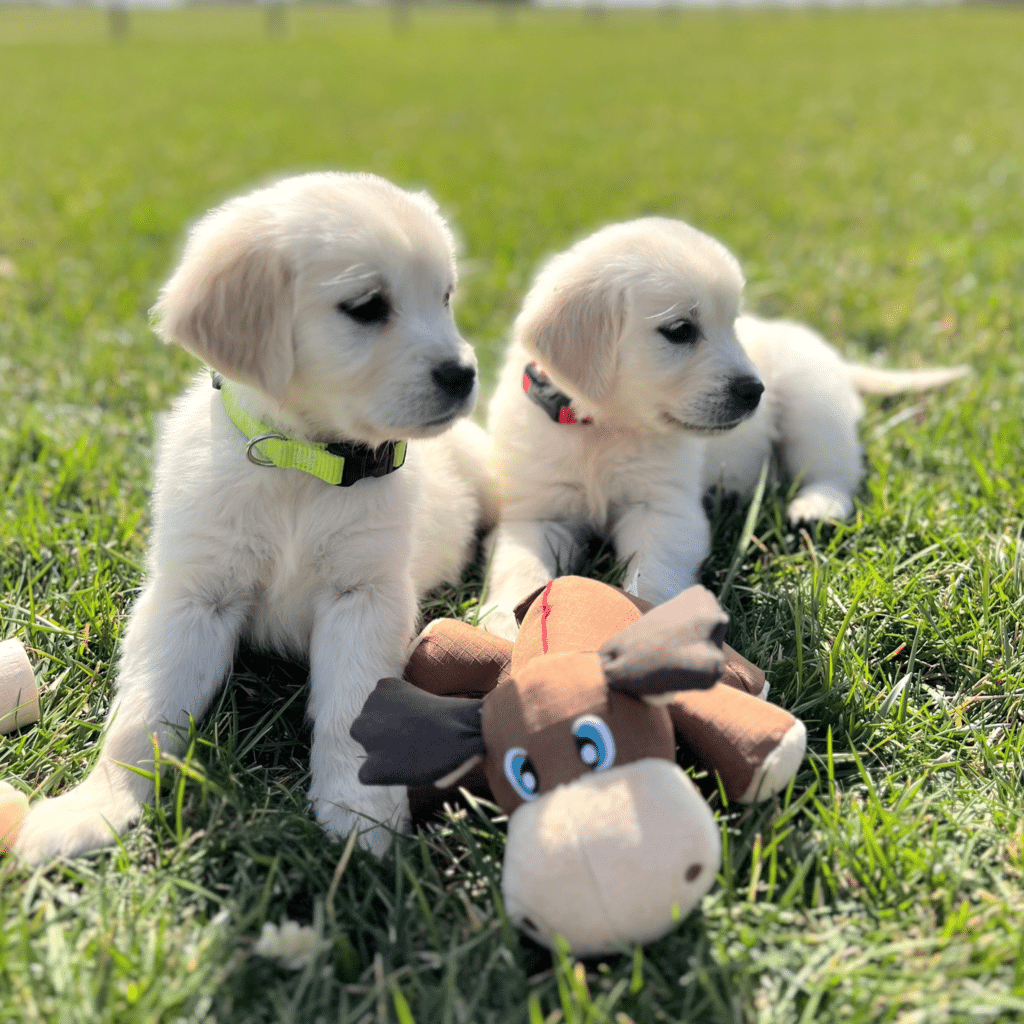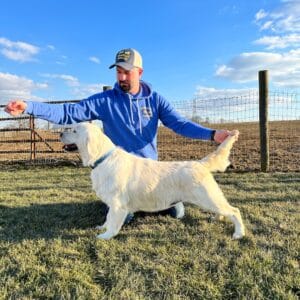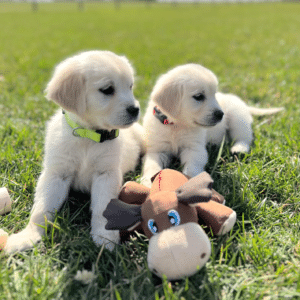I still remember the day the Andersons brought their three-year-old twins to meet our European Golden Retriever puppies. Like many parents, they were nervous. Would these puppies be too energetic, too large, or too unpredictable for their young owners? Two hours later, as the twins giggled while a patient puppy gently took treats from their small hands, those concerns had melted away.
Finding the perfect family dog when you have young children isn’t just about choosing a breed – it’s about finding the right temperament, energy level, and natural affinity for children. After placing hundreds of European Golden Retrievers with families over the years, I’ve seen firsthand why these dogs consistently excel in homes with young children.
The European Golden Temperament Advantage
What truly sets European Golden Retrievers apart for families is their remarkably steady temperament. European breeding standards have long emphasized the combination of balanced personality traits and physical characteristics, resulting in dogs that exhibit exceptional patience and emotional stability.
The typical European Golden possesses a calm confidence that serves them beautifully in the sometimes chaotic environment that comes with young children. Where more highly-strung dogs might become anxious or overstimulated by a toddler’s unpredictable movements or sudden noises, European Goldens typically respond with gentle curiosity or calm acceptance.
I’ve watched countless European Golden puppies encounter children for the first time – the natural gentleness they display is remarkable. Even young puppies seem to instinctively understand the need for gentler play and more cautious movement around small humans.
Parents often tell me how their European Golden will patiently allow their toddler to practice “gentle petting” (which isn’t always gentle!), or how their dog calmly walks beside a wobbly new walker, seeming to understand the child’s unsteady balance. This natural inclination toward gentleness isn’t accidental – it’s the result of generations of breeding for temperament traits that make superior family companions.
Physical Characteristics That Benefit Family Life
Beyond temperament, European Golden Retrievers possess physical characteristics that make them well-suited for life with young children. Their sturdy build means they’re less likely to be injured during enthusiastic play. At the same time, their medium to large size makes them both substantial enough to handle children’s interactions and manageable enough for family life.
European Goldens typically have slightly more compact frames than their American counterparts, with balanced proportions that contribute to their stability around small children. This solid structure allows them to absorb the occasional toddler hug or lean without becoming unbalanced.
Their famous coats do require regular maintenance, but many families find that establishing a weekly brushing routine becomes valuable bonding time with older children. Teaching children to help with gentle brushing or feeding helps build their responsibility and connection with the family dog.
Most importantly for busy families, European Goldens possess remarkable adaptability when it comes to exercise. While they certainly benefit from regular activity, they typically don’t exhibit the extreme exercise demands that make some breeds challenging for families. A European Golden can enjoy a backyard play session with the kids after school and then settle contentedly while you manage the dinner and bedtime routines.
Creating Successful Child-Dog Relationships
Even with the ideal family dog, successful relationships require proper guidance and boundaries. We always advise families to maintain appropriate supervision between dogs and young children – not because we don’t trust our dogs, but because teaching proper interaction benefits both the child and the dog.
For families with babies or expecting a baby, European Goldens tend to adapt beautifully to these new family members. I recommend gradual introduction strategies, such as allowing the dog to become familiar with baby sounds and smells before the actual introduction. Many European Goldens naturally exhibit a protective and gentle demeanor around infants, often choosing to lie near the baby during nap times.
Toddlers require more active guidance as they learn to engage in appropriate interactions. Simple, consistent rules like “gentle hands” and “no bothering the dog while eating” lay the groundwork for respect. European Goldens’ natural patience provides more room for the learning process; however, parents should still ensure that children respect the dog’s space and signals.
School-aged children can take on more responsibility with the family dog, participating in training, walking, and care routines. These shared activities strengthen bonds and teach valuable life skills. Many families tell us their European Golden becomes their child’s confidant and emotional support through childhood challenges.
Family Experiences
The adaptation period varies by family, but most report that their European Golden settles into family routines within a few weeks. The dogs seem particularly adept at learning family schedules and adjusting their behavior to match the children’s energy levels at different times of day.
The long-term benefits often surprise families. Beyond companionship, children who grow up with dogs, such as European Golden Retrievers, frequently develop greater empathy, responsibility, and emotional intelligence. Research supports our observations, children with dogs usually exhibit improved social skills and reduced stress levels.
Start Your Family’s Golden Journey
At Rockvale, we take special care when matching European Golden Retrievers with families who have young children. We observe each puppy’s temperament from an early age, noting those with exceptional patience, gentleness, and resilience – all crucial traits for success in homes with children.
Our family placements include comprehensive support during the transition period, along with specific guidance on introducing your new puppy to children of different ages. We’re always available to answer questions and provide strategies as your family and puppy adjust to life together.
Before bringing home your puppy, we recommend preparing children by discussing appropriate behavior and expectations. We offer resources specifically designed to help children understand their role in welcoming a new puppy home.
Ready to explore whether a European Golden Retriever is right for your family? Contact us to discuss your specific family situation and needs. We’d love to help you determine if one of our puppies would be the perfect match for your family, creating a bond that will enrich your children’s lives for years to come.
After all, when we place a puppy with a family, we’re not just finding a home for our puppy; we’re helping create childhood memories that will last a lifetime.




